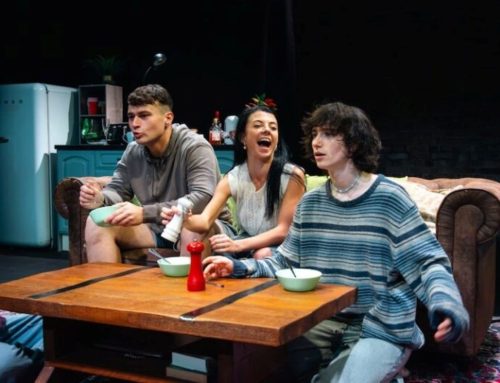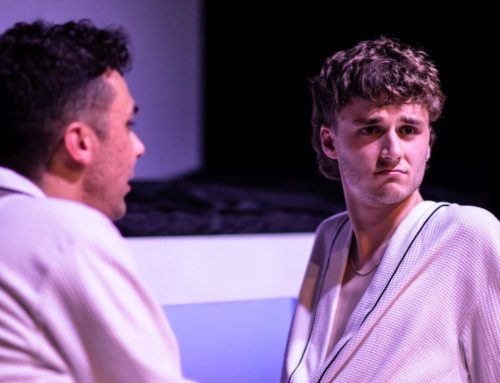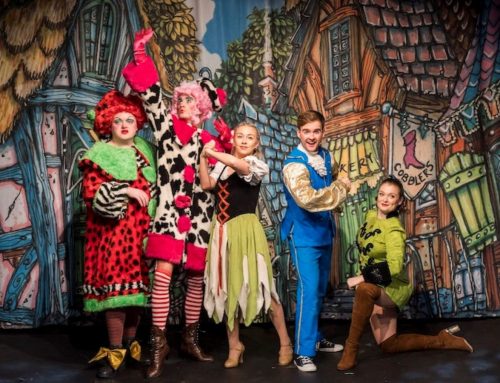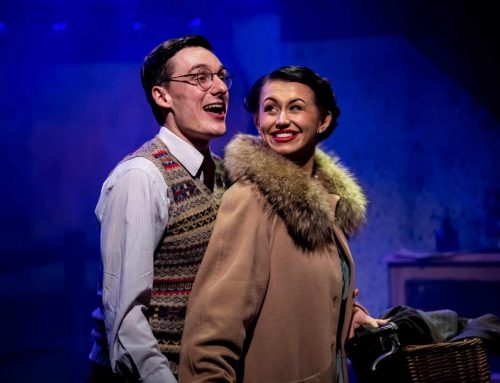Queer-inspired reimaginations of Jane Austen’s Pride and Prejudice are a more common species than one might initially imagine. Hollywood romcom Fire Island reworks much of the plot with a group of gay male friends on vacation at the eponymous New York holiday destination; the dune vegetation around Pemberley perhaps affording legroom for salacious encounters. Movie spoof Pride and Prejudice and Zombies has something of a queer subtext. Recent London fringe hit Pride and Prejudice (sort of) portrays Lizzie’s bestie Charlotte Lucas as a closet lesbian. David Kerby-Kendall’s wise, witty, and clever Gay Pride and No Prejudice adds to the reimagination oeuvre with gentle comedy and a subtly hard-edged message.
Mr Darcy has harboured feelings for Bingley since their childhood. What began as innocent affection has transformed into a deeper, more perilous kind of sensual longing. Meditating on the very great pleasure which a pair of fine eyes in the face of a handsome man can bestow, Darcy has a series of questions to face. Should he dare to acknowledge and express his love, and how will society and the object of his affections judge him if he does? Where does discretion end, and courage begin?
Anticipate excessive diversion as Kerby-Kendall explores whether Darcy’s happiness lies with his childhood friend, or if his fate is inextricably enmeshed with outspoken feminist and campaigner for gender equality Lizzie. And indeed, will the seemingly formal and stuffy Bingley turn out to be quite as smitten with the coy, conservative Jane Bennet (Sophie Bradley on great form) as his initial behaviour suggests. “Happiness in marriage is entirely a matter of chance” Charlotte Lucas tells us in the original. But chance, like fate, is a thing to be sorely tempted.
Kerby-Kendall has a dozen plays and a couple of novels under his belt, so knows a thing or two about narrative (aided here by channelling Austen’s story into a different direction rather than wholly reinventing it). In fact, Gay Pride and No Prejudice’s plot races with the momentum of a four-horse phaeton that has thrown its driver and is headed, full speed, into the lake where Colin Firth infamously swims naked. Early on one wishes director Luke Fredericks would just slow it all down a bit.
Later scenes allow Kerby-Kendall’s wistfully comic writing to air to greater effect. Beneath the wit lies a sharp message about male privilege, and the historic need for some gay men to marry women solely as a convenient form of camouflage. Understandable for the men, but what is in it for the women and why should they be lied to?
Tremendous performances complement the piece. Sophie Bloor’s politically aware, self-confident, lippy Lizzie is an absolute delight. Her dogged refusal to “accept my part at the bottom of society because I have breasts” partly explains her attraction for the seemingly feminist-supporting Darcy. Marianne March has impeccable comic timing as the ditsy but amiable Mrs Bennet who has “no problem discussing the carnal lusts” and ponders whether “homosexuals eat beef” when planning dinner.
Writer: David Kerby-Kendall
Director: Luke Fredericks
Michael Gillette’s dashing Darcy smoulders to great effect and feels wholly in tune with Austen’s character (or at least Colin Firth’s rendering of it), even if he turns out to be rather less woke than he thinks he is. “I love you with the completeness of my cold heart” he tells Bingley at one point. “I’d rather place my penis in a jar and stand in a swarm of bees” is his blunt assessment of Lizzie’s attractions. Noah Butt is great too as the stale, conventional Bingley, whose determination to conform with social expectations threatens to destroy future happiness. The man’s virile reaction to an embrace with Jane offers a dramatic complication and a timely reminder than sexuality can be fluid and context driven.
More Recent Reviews
The Sea Horse. Golden Goose Theatre.
The Sea Horse, Edward J Moore’s grim slice of mid-century realism, debuted to solid reviews off-Broadway in 1974. Since [...]
Garry Starr: Classic Penguins. Arts Theatre.
Emperor penguins’ shortish treks between sea and nesting sites are about as peripatetic as your average Thameslink commuter. Garry [...]
When the Clarion Came to Call. Cockpit Theatre.
When, upon entering an auditorium, you are told, ‘Take as many pictures as you like, but mind the ceramics,’ [...]






